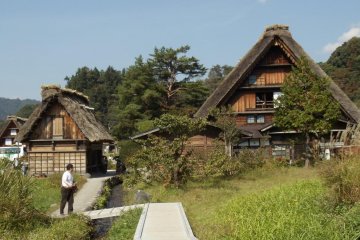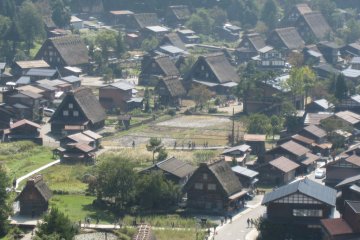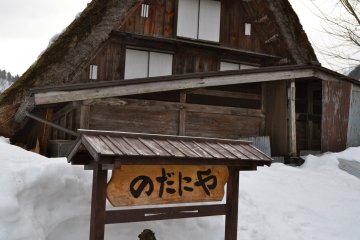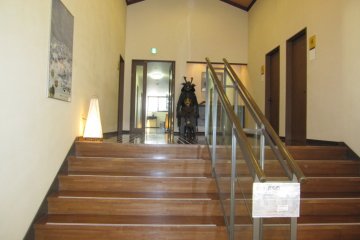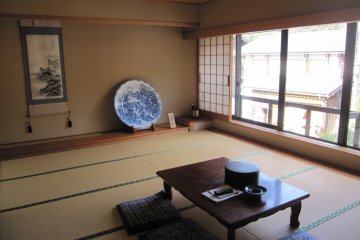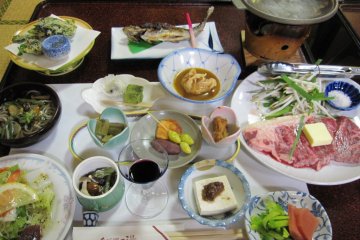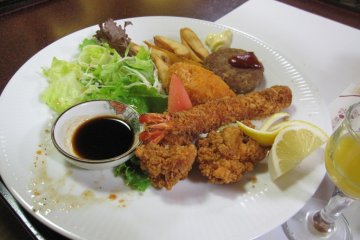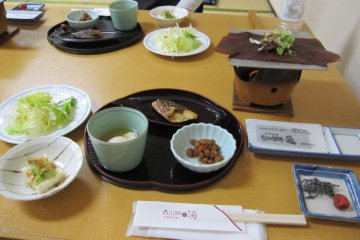Right in the downtown of Shirakawa-go is "Shirakawa-go no Yu". This 10-year-old ryokan is located just inside the vehicle restriction zone alongside the river. An imposing structure, it is an all wooden building, the outside of which gives the appearance of a rustic country mountain lodge. Once inside the foyer we were greeted by a sleek modern, clean, upscale interior which was quite unexpected. In fact the entire building inside was clean, inviting, and suggested we were in for a very nice stay.
Following check-in we were shown our very spacious room with a beautiful view of the mountains. We had hoped to get a room over looking the river but the view of the main street and mountains through a very large series of picture windows was just as pleasant. The large main rooms are named for Japanese wood such as Japanese Horse Chestnut, Japanese Oak and Zelkova.
Commonly in Japanese ryokans tea and a small sweet is waiting to welcome you. At Shirakawa-go no yu, the welcome is sweet green tea and a wonderfully fresh chestnut rice cake. Most rooms do not have private toilets or showers so we had to use communal toilets and washbasins. But everything is so clean and pleasant that it just feels like you are going down the hall in a friend's home.
As we knew there was a lot to do in this historic Japanese village, a UNESCO designated historic site, we set out from the hotel to explore the attractions of Shirakawa-go. Vehicular traffic is a problem but, pedestrians abound and many streets are empty enough to walk quite comfortably and easily to attractions such as the the Wada house and the Gasho folk museum.
The hotel is active all day long as the onsen and restaurant are open to all locals and guests. Because of this, even hotel guests needed ¥100 coins for the shoe locker and the lockers in the onsen. What’s very nice is the ¥100 coin is given back, once you use the key to open the locker to retrieve your shoes. Win-win on that one.
The onsen at Shirakawa-go no yu is busy most of the day as many guests come from local minshukus and campsites use it. We went in around 5:30pm and were still able to take a comfortable long bath. The changing room had about 40 coin lockers to use. The onsen is a large cavernous room with 12 shower spots and two pools. The inside onsen had jacuzzi jets on the far side and hot water coming out of a model of a Gassho house. From the rotenburo (outdoor onsen) we could watch the sun set over the mountains and listen to the river flow over the rocks. We slipped into the silky water and the day’s journey and strain just flowed away. I was actually sad to get out and go to dinner. I could have stayed in there till I looked like a prune.
Next it was off to dinner which in a Ryokan means a large meal, multi-course feast of fantastic presentation. Our dinner consisted of thirteen dishes including grilled river trout, a big hida steak, soba noodles, a lettuce and squid salad, vegetable tempura, tofu, and several vegetable dishes. One of my party had a shrimp and shellfish allergy so the kitchen prepared food separately for him so that none of the juices would get into his food. We had our children with us as well and eating thirteen dishes would have been impossible. We had the choice of just sharing our meals with them or ordering a children’s meal upon making our reservation. We chose the children’s meal which came with a hamburger steak, deep fried shrimp, chicken nuggets, a crab cream croquette, salad and a big bowl of Neapolitan spagetti. For me the highlight was cooking my own steak on a grill at my table. I mixed butter, salt and a variety of vegetables with the nice large 2cm thick steak and put it on the flame. Japanese beef is quite fatty but as a result it is super filling.It is always good to eat slowly, talk about the food and discuss the day with your party at a ryokan, but we neglected to do so and ended up stuffed before even finishing even half of the dishes. It was all so delicious and flavorful that we just took it in too quickly. My kids inhaled their dinners leaving very little.
We walked back to our room to find the futons ready for the night. We spent the rest of the evening relaxing and reflecting on the day. We took advantage of the free wi-fi to use our iPad to plan the next day’s exploration. Though we brought toys for our children, they found running back and forth on the futons and practicing their acrobatic skills far more fun. The futons at Shirakawa-go no yu are thick and very supportive while the pillows are fairly firm and filled with beads. Every time you roll over, you will hear it. Around 9:00 we headed into a wonderful night sleep. Children can have their own futon but it costs extra. We decided to let them sleep with us.
The next morning we awoke to beautiful fall day. We ventured back to the onsen which was fairly empty and then off for another stomach filling Japanese breakfast of rice, table grilled miso, onsen boiled egg ( the white was soupy while the yolk was hard), fish, salad, miso soup, beans and tofu. Again the children were given their own breakfast of eggs, sausage, rice and miso soup. Dinner was still in our bellies so it was difficult to finish breakfast. To the westerner, a Japanese breakfast can seem odd (“fish for breakfast?”) but it is highly balanced, healthy and filling.
Clearly well fed and very full, we returned to the room, packed our things and proceeded to check-out. They staff let us split the bill between our party’s members and pay with different credit cards. The staff wished us well and waved goodbye as we departed on our journey to Gujo-Hachiman.Shirakawa-go no Yu is one of the only ryokans in Shirakawa-go. For those traveling with elderly or children or just wanting some western comforts, it is the perfect option.



